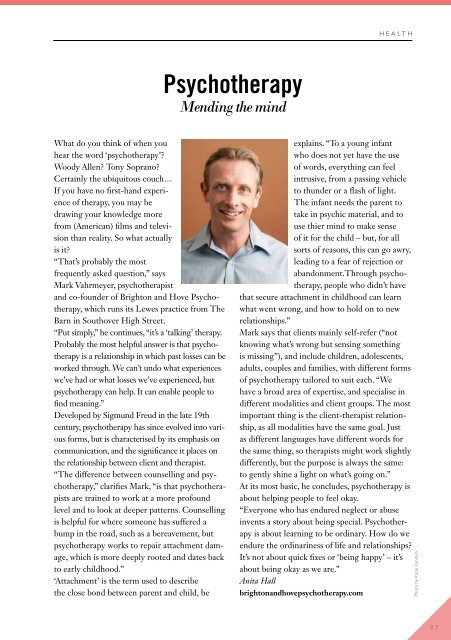Viva Lewes Issue #150 March 2019
You also want an ePaper? Increase the reach of your titles
YUMPU automatically turns print PDFs into web optimized ePapers that Google loves.
HEALTH<br />
Psychotherapy<br />
Mending the mind<br />
What do you think of when you<br />
hear the word ‘psychotherapy’?<br />
Woody Allen? Tony Soprano?<br />
Certainly the ubiquitous couch…<br />
If you have no first-hand experience<br />
of therapy, you may be<br />
drawing your knowledge more<br />
from (American) films and television<br />
than reality. So what actually<br />
is it?<br />
“That’s probably the most<br />
frequently asked question,” says<br />
Mark Vahrmeyer, psychotherapist<br />
and co-founder of Brighton and Hove Psychotherapy,<br />
which runs its <strong>Lewes</strong> practice from The<br />
Barn in Southover High Street.<br />
“Put simply,” he continues, “it’s a ‘talking’ therapy.<br />
Probably the most helpful answer is that psychotherapy<br />
is a relationship in which past losses can be<br />
worked through. We can’t undo what experiences<br />
we’ve had or what losses we’ve experienced, but<br />
psychotherapy can help. It can enable people to<br />
find meaning.”<br />
Developed by Sigmund Freud in the late 19th<br />
century, psychotherapy has since evolved into various<br />
forms, but is characterised by its emphasis on<br />
communication, and the significance it places on<br />
the relationship between client and therapist.<br />
“The difference between counselling and psychotherapy,”<br />
clarifies Mark, “is that psychotherapists<br />
are trained to work at a more profound<br />
level and to look at deeper patterns. Counselling<br />
is helpful for where someone has suffered a<br />
bump in the road, such as a bereavement, but<br />
psychotherapy works to repair attachment damage,<br />
which is more deeply rooted and dates back<br />
to early childhood.”<br />
‘Attachment’ is the term used to describe<br />
the close bond between parent and child, he<br />
explains. “To a young infant<br />
who does not yet have the use<br />
of words, everything can feel<br />
intrusive, from a passing vehicle<br />
to thunder or a flash of light.<br />
The infant needs the parent to<br />
take in psychic material, and to<br />
use thier mind to make sense<br />
of it for the child – but, for all<br />
sorts of reasons, this can go awry,<br />
leading to a fear of rejection or<br />
abandonment.Through psychotherapy,<br />
people who didn’t have<br />
that secure attachment in childhood can learn<br />
what went wrong, and how to hold on to new<br />
relationships.”<br />
Mark says that clients mainly self-refer (“not<br />
knowing what’s wrong but sensing something<br />
is missing”), and include children, adolescents,<br />
adults, couples and families, with different forms<br />
of psychotherapy tailored to suit each. “We<br />
have a broad area of expertise, and specialise in<br />
different modalities and client groups. The most<br />
important thing is the client-therapist relationship,<br />
as all modalities have the same goal. Just<br />
as different languages have different words for<br />
the same thing, so therapists might work slightly<br />
differently, but the purpose is always the same:<br />
to gently shine a light on what’s going on.”<br />
At its most basic, he concludes, psychotherapy is<br />
about helping people to feel okay.<br />
“Everyone who has endured neglect or abuse<br />
invents a story about being special. Psychotherapy<br />
is about learning to be ordinary. How do we<br />
endure the ordinariness of life and relationships?<br />
It’s not about quick fixes or ‘being happy’ – it’s<br />
about being okay as we are.”<br />
Anita Hall<br />
brightonandhovepsychotherapy.com<br />
Photo by Katie Vandyck<br />
97


















